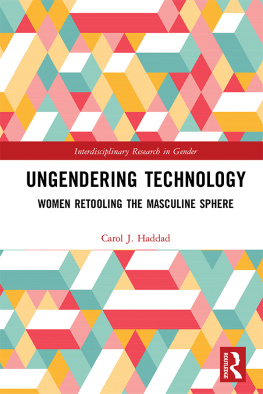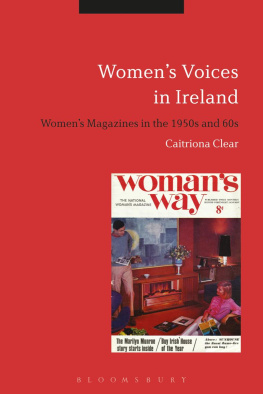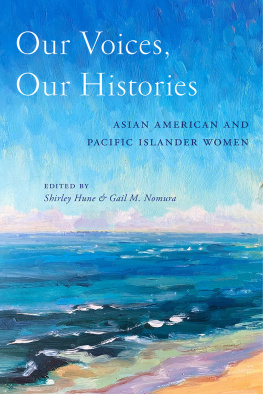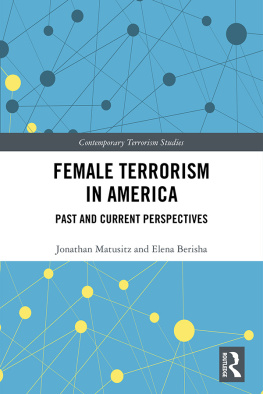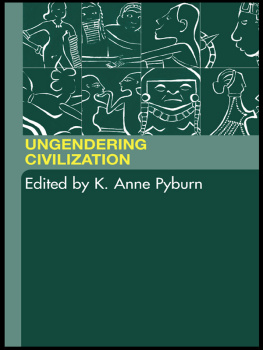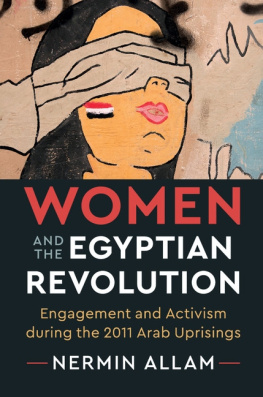Ungendering Technology
This book offers fresh insight into womens mastery of technologies commonly associated with men, with important implications for institutional efforts to identify and support technical proficiency among girls and women.
The work is structured across five original case studies featuring: breast cancer survivors in Newfoundland who constructed a wooden dragon boat using hand and power tools; Egyptian women who used information and communication technologies for political action during the Revolution of 2011; pioneer female audio engineers in the United States working in live concert and studio venues; U.S. female commercial airline pilots who mastered the complexity of flying large aircraft; and a university-educated woman working in sewer maintenance and repair for the City of Detroit in the 1970s. The case studies capture womens own voices and present a range of historical and geographic locations.
A major contribution of this volume is the multidisciplinary analytical framework used to explain womens motivation to engage with non-traditional technologies, the role of peer and political support in encouraging persistence, and informal as well as formal knowledge and skill acquisition. Above all, it is a story of womens empowerment individually and collectively.
This is a unique book suitable for undergraduates and graduates in the fields of womens and gender studies; science, technology and society (STS) studies; engineering education; and adult education.
Carol J. Haddad is Professor Emerita, Eastern Michigan University. She served as a Professor in the School of Technology and Professional Services Management for 22 years, and also as a faculty affiliate in the Womens and Gender Studies Department, which she headed on an interim basis. She has published on gender and voice in the virtual classroom, and has presented conference papers on student learning outcomes in the Women and Technology and Green Technology courses she developed and taught online.
Dr. Haddad is recognized internationally for her scholarship on the management of technological change, which generated funded research projects culminating in her 2002 book Managing Technological Change: A Strategic Partnership Approach (Sage Publications). She was elected to the Honor Society of Phi Kappa Phi in 2013. Prior to arriving at EMU in 1993, she was a tenured faculty member in labor studies at Michigan State University, and held senior research management positions in the private sector.
She holds a Ph.D. from the University of Michigan (Ann Arbor) in higher and adult continuing education, and an M.S. in labor studies from the University of Massachusetts at Amherst.
Interdisciplinary Research in Gender
Reflective Reading and the Power of Narrative
Producing the Reader
Karyn Sproles
Actresses and Mental Illness
Histrionic Heroines
Fiona Gregory
Cultural Production and the Politics of Womens Work in American Literature and Film
Polina Kroik
Masculinities and Desire
A Deleuzian Encounter
Marek Wojtaszek
Feminism, Republicanism, Egalitarianism, Environmentalism
Bill of Rights and Gendered Sustainable Initiatives
Yulia Maleta
Ungendering Technology
Women Retooling the Masculine Sphere
Carol J. Haddad
Ageing and Contemporary Female Musicians
Abigail Gardner
https://www.routledge.com/Interdisciplinary-Research-in-Gender/book-series/IRG
First published 2019
by Routledge
2 Park Square, Milton Park, Abingdon, Oxon OX14 4RN
and by Routledge
52 Vanderbilt Avenue, New York, NY 10017
Routledge is an imprint of the Taylor & Francis Group, an informa business
2019 Carol J. Haddad
The right of Carol J. Haddad to be identified as author of this work has been asserted by her in accordance with sections 77 and 78 of the Copyright, Designs and Patents Act 1988.
All rights reserved. No part of this book may be reprinted or reproduced or utilised in any form or by any electronic, mechanical, or other means, now known or hereafter invented, including photocopying and recording, or in any information storage or retrieval system, without permission in writing from the publishers.
Trademark notice: Product or corporate names may be trademarks or registered trademarks, and are used only for identification and explanation without intent to infringe.
British Library Cataloguing-in-Publication Data
A catalogue record for this book is available from the British Library
Library of Congress Cataloging-in-Publication Data
Names: Haddad, Carol Joyce, author.
Title: Ungendering technology : women retooling the masculine sphere / Carol J. Haddad.
Description: First edition. | Abingdon, Oxon : Routledge, 2019. | Includes bibliographical references and index.
Identifiers: LCCN 2019009964 (print) | LCCN 2019013673 (ebook) | ISBN 9780429273384 (master ebook) | ISBN 9780367221287 (hardback : alk. paper) | ISBN 9780429273384 (ebook)
Subjects: LCSH: Women in technology.
Classification: LCC T36 (ebook) | LCC T36. H33 2019 (print) | DDC 331.4/8dc23
LC record available at https://lccn.loc.gov/2019009964
ISBN: 978-0-367-22128-7 (hbk)
ISBN: 978-0-429-27338-4 (ebk)
This book was inspired by my longstanding scholarly interest in womens relationships with technology, and more specifically by 21 years of teaching a cross-listed university course entitled Women and Technology that I designed in 1993 for the department of Womens and Gender Studies and the School of Technology Studies at Eastern Michigan University. That course addressed technology development and use in a variety of domains, and served as an analytical forum for graduate and undergraduate students to examine cross-disciplinary research literature, both contemporary and historic, in an effort to determine whether technology contributed to womens empowerment or rather whether it reinforced gender-based social and economic power differentials. My background in adult education enabled me to design the course so that students were encouraged to incorporate their own experiences with technology into their analysis of assigned readings and peer-led weekly discussions. In 1999 I migrated the course from the physical classroom to the World Wide Web to permit greater access by our non-traditional student population most of whom had work and/or family responsibilities. Women comprised the majority of the students, but the course attracted men most semesters as well.
Women's interactions with technology had been the subject of significant discourse among second-wave feminist scholars and activists, and writings from that period served as readings for the Women and Technology course initially. In that literature, while women were encouraged to harness technology for their own purposes, there was a recognition that technical innovation was unlikely to benefit or liberate women when embedded in discriminatory social structures (Haddad 1987; Wajcman 1991) despite a persistent myth associating technology with progress (Leonard 2003).
Noted feminist sociologist Judy Wajcman astutely observed that while there was a tendency among some second-wave feminists to portray women as victims of technology, subsequent scholarship on information and communications technologies (ICTs) and biotechnologies stressed womens agency and capacity for empowerment (Wajcman 2007, 292). Moreover, the experiences of some of the

